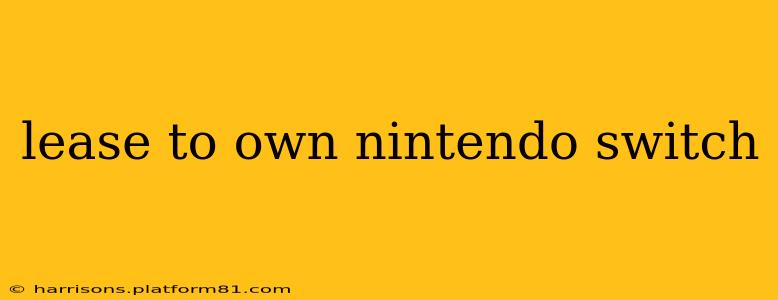The Nintendo Switch has taken the gaming world by storm, offering a unique blend of home console power and portable convenience. But its price tag can be a significant hurdle for some gamers. Fortunately, lease-to-own options offer a flexible alternative to upfront purchasing, allowing you to enjoy the latest games and console features without the immediate financial strain. This guide explores the possibilities of leasing a Nintendo Switch and helps you navigate the process.
Is There Such a Thing as a Lease-to-Own Nintendo Switch?
While Nintendo doesn't directly offer lease-to-own programs for the Switch, several third-party retailers and financing companies provide similar services. These options typically involve making monthly payments over a set period, with the option to own the console outright once the payments are complete. It's crucial to understand the terms and conditions before committing to any lease-to-own agreement.
How Does a Lease-to-Own Program Work?
A typical lease-to-own arrangement involves these steps:
- Application: You apply for the lease-to-own plan, providing necessary personal and financial information.
- Approval: The company reviews your application and approves or denies your request based on creditworthiness and other factors.
- Agreement: Upon approval, you sign a lease agreement outlining the monthly payment amounts, the total lease term, and the option to purchase the console at the end of the term.
- Payments: You make regular monthly payments according to the agreement.
- Ownership: Once all payments are made, you typically own the Nintendo Switch.
Important Note: Always carefully read the fine print of any lease-to-own agreement. Be aware of potential early termination fees, late payment penalties, and other charges.
What are the Advantages of Leasing a Nintendo Switch?
- Lower upfront cost: Avoids the need for a large initial investment.
- Budget-friendly payments: Spreads the cost over a period, making it more manageable.
- Access to the latest technology: Allows you to enjoy the console immediately without saving for a long period.
- Potential for upgrades: Some programs might offer options to upgrade to newer models after a certain period.
What are the Disadvantages of Leasing a Nintendo Switch?
- Higher overall cost: The total amount paid over the lease term is often higher than the console's retail price.
- Credit check required: Your application may impact your credit score.
- Potential for repossession: Failure to make timely payments can lead to the repossession of the console.
- Limited options: Lease-to-own options for the Nintendo Switch might be less prevalent compared to other electronics.
Where Can I Find a Lease-to-Own Nintendo Switch?
Finding a direct lease-to-own option for a Nintendo Switch can be challenging. You may have better luck exploring options through general electronics retailers offering rent-to-own programs or exploring financing options with your bank or credit union. These options may not explicitly label themselves as "lease-to-own," but they can provide similar financial flexibility. Always compare the terms and conditions before making a decision.
What are the Alternatives to Leasing a Nintendo Switch?
- Saving up: While requiring more patience, saving up for the console's retail price ensures you own it outright without additional fees.
- Used consoles: Buying a pre-owned Nintendo Switch can significantly reduce the upfront cost.
- Payment plans: Many retailers offer in-house financing options that can be more straightforward than lease-to-own arrangements.
Choosing a Nintendo Switch through a lease-to-own program or a similar financing method requires careful consideration of your financial situation and the terms of the agreement. By understanding the advantages and disadvantages, you can make an informed decision that best aligns with your gaming needs and budget. Remember to always read the contract meticulously before signing.
